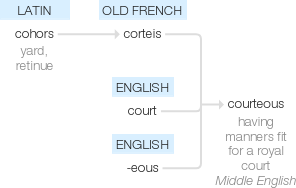Courteous
Middle English (meaning ‘having manners fit for a royal court’): from Old French corteis, based on Latin cohors ‘yard, retinue’ (see court). The change in the ending in the 16th century was due to association with words ending in -eous.
wiktionary
From Old French curteis (French courtois), from cort(“court”), displaced native Old English hende(“courteous, gracious, friendly”).
etymonline
courteous (adj.)
c. 1300, curteis, "having elegant manners, well-bred, polite, urbane," also "gracious, benevolent," from Old French curteis (Modern French courtois) "having courtly bearing or manners," from curt "court" (see court (n.)) + -eis, from Latin -ensis.
Rare before c. 1500. In feudal society, also denoting a man of good education (hence the name Curtis). Medieval courts were associated with good behavior and also beauty; compare German hübsch "beautiful," from Middle High German hübesch "beautiful," originally "courteous, well-bred," from Old Franconian hofesch, from hof "court." Related: Courteously (mid-14c., kurteis-liche).
